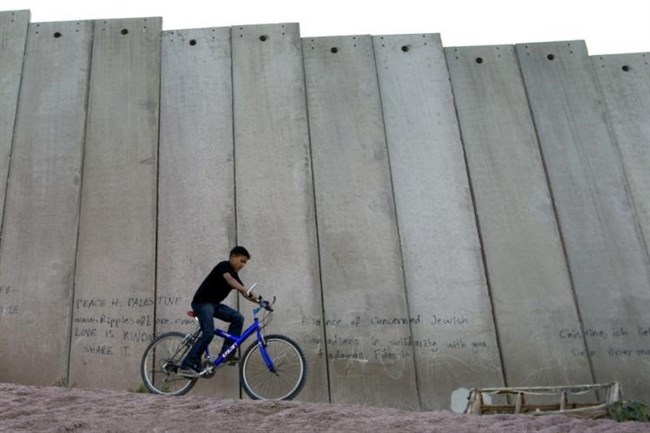Palestinians tear down Israeli iron gate in protest of separation wall
A group of Palestinian youths allegedly managed to bring down an iron gate that was set up by Israeli forces as part of Israel’s illegal separation wall, running through the village of Anata in the central occupied West Bank district of Jerusalem.
Spokesperson of the Fatah movement in the nearby Shufat refugee camp in occupied East Jerusalem, Thaer Fasfous, told Ma’an that several youth used hand tools to bring down the gate on Friday as an act of protest against Israel’s separation wall.
Fasfous pointed out that the gate is located in the middle of the separation wall that runs through Anata, and separates it from the nearby illegal settlement of Pisgat Zeev.
Fasfous said that as the youth were taking down the gate, an Israeli army patrol raided the village, sparking clashes between soldiers and youths. Israeli forces fired stun grenades, tear gas, and rubber-coated steel bullets at locals.
Dozens suffered from severe tear-gas inhalation while one youth was injured with a rubber-coated steel bullet.
Israel’s separation wall, expected to reach 708 kilometers upon its completion — 88 percent of which is planned inside occupied Palestinian territory, is a common sight in the occupied West Bank, where Israeli-installed cement walls and barrier fences zig zag throughout the landscape.
Israeli leaders often claim that the wall serves a security purpose to deter potential Palestinian attacks on Israelis. However, many activists, academics, and analysts have said that the wall is instead a massive “land grab” of large tracts of the Palestinian territory, and a strategy to consolidate Israel’s sovereignty over Area C — the more than 60 percent of the occupied West Bank under full Israeli control — where all of Israel’s illegal settlements are built or are in the process of being constructed.
Area C of the West Bank was expected to be gradually transferred to the jurisdiction of the Palestinian Authority (PA) according to the Oslo peace agreements in the 1990s. However, decades later Israel still maintains full civil and military control over the area.
Israel began building the separation wall with concrete slabs, fences, and barbed-wire inside the occupied West Bank in 2002 at the height of the Second Intifada, claiming it was crucial for security.
The ICJ issued an advisory opinion in 2004 stating that the wall was illegal under international law and its construction must stop immediately, adding that reparations should be paid to Palestinians whose properties were damaged as a result of the construction.
However, the wall’s construction has continued unabated, encroaching deep into the Palestinian territory, and leaving Palestinian neighborhoods stranded on both sides of the barrier, and isolating communities from their agricultural lands.
Source: Website

